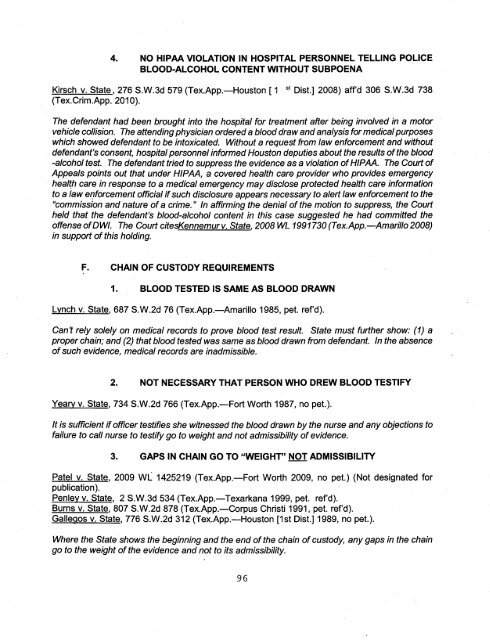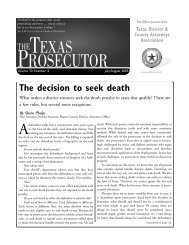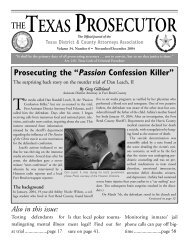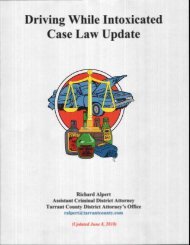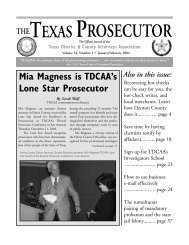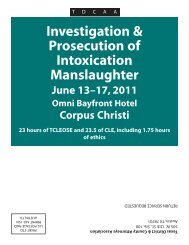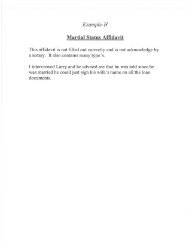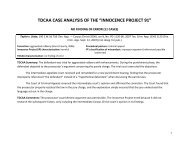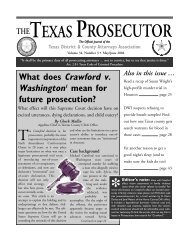Driving While Intoxicated Case Law Update - Texas District ...
Driving While Intoxicated Case Law Update - Texas District ...
Driving While Intoxicated Case Law Update - Texas District ...
You also want an ePaper? Increase the reach of your titles
YUMPU automatically turns print PDFs into web optimized ePapers that Google loves.
4. NO HIPAA VIOLATION IN HOSPITAL PERSONNEL TELLING POLICE<br />
BLOOD-ALCOHOL CONTENT WITHOUT SUBPOENA<br />
Kirsch v. State, 276 S.W.3d 579 (Tex.App.-Houston [ 1 st Dist.] 2008) aff'd 306 S.W.3d 738<br />
(Tex.Crim.App. 2010).<br />
The defendant had been brought into the hospital for treatment after being involved in a motor<br />
vehicle collision. The attending physician ordered a blood draw and analysisfor medicalpurposes<br />
which showed defendant to be intoxicated. Without a request from law enforcement and without<br />
defendant's consent, hospital personnel informed Houston deputies about the results of the blood<br />
-alcohol test. The defendant tried to suppress the evidence as a violation of HIPAA. The Court of<br />
Appeals points out that under HIPAA, a covered health care provider who provides emergency<br />
health care in response to a medicalemergency may dr'sc/ose protected health care information<br />
to a law enforcement official if such disclosure appears necessary to alert law enforcement to the<br />
"commission and nature of a crime." In affirming the denial of the motion fo suppresg the Court<br />
held that the defendant's blood-alcohol content in this case suggesfed he had committed the<br />
offenseof DWl. The Court citesKennemurv.Stalg 2008WL1991730 (Tex.App.-Amarillo2008)<br />
in support of this holding.<br />
f.<br />
cHArN oF cusToDY REQUIREMENTS<br />
1. BLOOD TESTED IS SAME AS BLOOD DRAWN<br />
Lvnch v. State, 687 S.W.2d 76 (Tex.App.-Amarillo 1985, pet. ref'd).<br />
Can't rely solely on medical records to prove blood fesf resu/f. Sfafe musf further show: (1) a<br />
proper chain; and (2) that blood tested was same as blood drawn from defendant. In the absence<br />
of such evidence, medical records are inadmissible.<br />
2. NOT NECESSARY THAT PERSON WHO DREW BLOOD TESTIFY<br />
Yeary v. State, 734 S.W.2d766 (Tex.App.-Fort Worth 1987, no pet.).<br />
It is sufficient if officer fesfffies she wifnessed the blood drawn by the nurse and any objections to<br />
failure to call nurse to testify go to weight and not admissibility of evidence.<br />
3. GAPS IN CHAIN GO TO "WEIGHT'' NOT ADMISSIBILITY<br />
Patel v. State, 2009 WL 1425219 (Tex.App.-Fort Worth 2009, no pet.) (Not designated for<br />
publication).<br />
Penley v. State, 2 S.W.3d 534 (Tex.App.-Texarkana 1999, pet. ref'd).<br />
Burns v. State, 807 S.W.2d 878 (Tex.App.-Corpus Christi 1991, pet. ref'd).<br />
Galleqos v. State, 776 S.W.2d 312 (Tex.App.-Houston [1st Dist.] 1989, no pet.).<br />
Where fhe Sfafe shows the beginning and the end of the chain of custody, any gaps in the chain<br />
go to the weight of the evidence and not to its admissibility.<br />
96


